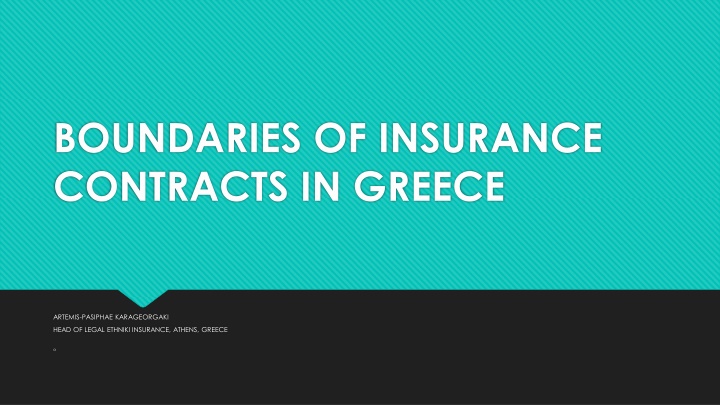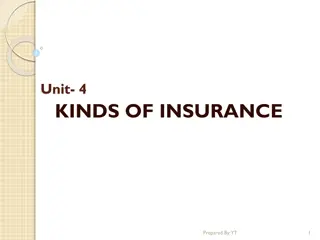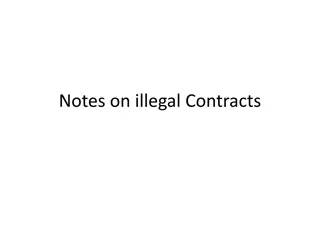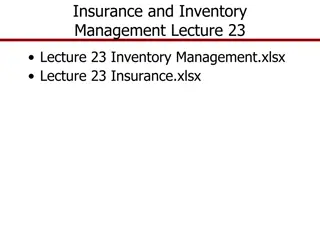Insurance Contracts in Greece: Boundaries and Definitions
The boundaries and definitions of insurance contracts in Greece are outlined in terms of statutory requirements, minimum contents, and various business models such as Peer-to-Peer insurance. The lack of a uniform European definition and the evolving nature of insurance activities present challenges in defining insurance contracts. The regulations and considerations specific to Greece's insurance landscape, including P2P insurance models, are also discussed.
Download Presentation

Please find below an Image/Link to download the presentation.
The content on the website is provided AS IS for your information and personal use only. It may not be sold, licensed, or shared on other websites without obtaining consent from the author.If you encounter any issues during the download, it is possible that the publisher has removed the file from their server.
You are allowed to download the files provided on this website for personal or commercial use, subject to the condition that they are used lawfully. All files are the property of their respective owners.
The content on the website is provided AS IS for your information and personal use only. It may not be sold, licensed, or shared on other websites without obtaining consent from the author.
E N D
Presentation Transcript
BOUNDARIES OF INSURANCE CONTRACTS IN GREECE ARTEMIS-PASIPHAE KARAGEORGAKI HEAD OF LEGAL ETHNIKI INSURANCE, ATHENS, GREECE a
Definition of insurance contract Europe Greece According to Article 1 of the ICA (Law 2496/1997), the minimum statutory or regulatory contents of an insurance contract are: the details of the contracting parties (insurer/policy holder) and the name of the person entitled to receive the insurance money (if policyholder); the period for which insurance cover is granted; the insured risks; the insured sum; exceptions to the cover; the premium; the applicable law; and the unit to which the policy is linked (with respect to unit- linked insurance policies). Not a uniform definition in a European Level. Only some member states have adopted statutory definition of insurance and the essential elements vary. that person is not the Reason? It is argued that defining insurance as an activity or as a contract is difficult because insurance linked to human activity is in constant state of evolution which a fixed definition may hinder insurance can be defined differently depending on whether one contemplates the legal relationship (insurer, policyholder, insured and beneficiary), the technical process (the mutualisation of a large number of risks) or even the tax qualification (e.g. in the case of life insurance or pensions).
Greece- Guarantees, Peer to Peer Report Conclusions Although there is no exact definition of both P2P insurance and insurance in general at EU level, either as an activity or as a contract three types of P2P business models a) P2P insurance managed by a licenced insurer, b) P2P insurance managed by licenced broker/intermediary backed by a licenced insurance undertaking, following all relevant insurance legislation, c) purely technical service providers/platform who acts as an administrator for the risk sharing groups, without an underlying insurance carrier P2P platforms that operate under models a) and b) will be licenced as an insurer or insurance intermediary, respectively, and consequently follow all insurance regulation 2019 EIOPA REPORT ON BEST PRACTICES ON LICENCING REQUIREMENTS, PEER-TO-PEER INSURANCE AND THE PRINCIPLE OF PROPORTIONALITY IN AN INSURTECH CONTEX
Greece- Peer to Peer Regarding Peer to Peerproduct guarantee The Greek supervisor has taken no position on peer to peer insurance or similar economic activities mentioned Examined at an ad hoc basis Concerns that all models of P2P should follow insurance regulation to protect consumers
Greece- Guarantee The intense competition has led to manufacturers and retailers provided extended guarantees and services which lengthen the product usual guarantees, moreover third companies (not manufacturers or sellers) solicit third party contracts to consumers offering repair/replacement or financial reimbursement. The question of whether these extended warranties constitute insurance has not been officially addressed by the Regulator. 10 years ago questions and complaints by insurance distributors associations, and consumers have lead big retailers to provide the extended product guarantees through product insurance contracts offered by insurance companies the retailer obtaining license for insurance intermediaries for its employees introducing, proposing or carrying out other work that is preparatory to the conclusion of contracts of (re)insurance, or of concluding such contracts
Greece- Group Insurance Group insurance widely used tailored to specific needs of groups of persons with similar characteristics (professional activity, clients of financial institutions (loans, mortgages, credit card, account holders,, employees) achieving economies of scale, lower premium since insurers assess and undwrite the risk as a whole, favourable tax regime Lack of regulation under Greek law Elective Group Insurance, the organisation that purchases the policy is considered as the policyholder and retains the master contract, members of the group fill an application to participate in the contract (in life and disability contracts sometimes filling simple health questionnaires with no underwriting if answer yes risk is rejected) and are silmiltaneously usually provided with a certificate of coverage typically do not have access to the terms of the group policy only a certificate with a summary called certificate of insurance
Greece- Group Insurance Usually (banks, car retailers, media providers ) act dually as a Policy Holder and a licensed insurance intermediary When not an intermediary the policy holder has the obligation to inform policy members distribute precontractual info and contract terms under terms of the master policy The insurer receives the application signed where the member verifies that he has been provided all the info provided by law but does not control/or knows of the procedure by which the members are informed and decide to apply (risks in u/l complex products with different investment products proposals/different risks) Problems when the policyholder does not observe the terms and conditions of the policy regarding the information of the members
Greece- Group Insurance Usually (banks, car retailers, media providers ) act as a Policy Holder and a licensed insurance intermediary When they do not possess the intermediary license (employers/unions/professional bodies) has the obligation to inform policy members distribute precontractual info and contract terms under master policy Problems for the insurer to ensure that the Manager/Policy Holder observes the terms and conditions of the policy and dutifully informs the policy members, collects and distributes premiums etc
Greece- Jurisprudence Supreme Court Jursiprudence -If the insurance policyholder and the insured do not coincide in the same person the insurance is contracted on behalf of another and constitutes a genuine third-party contract, governed by articles 410 et seq. of the Civil Code. In case a policy includes multiple natural persons whose property, life duration or events have been contractually linked to the insurer's obligation to provide insurance coverage then it involves multiple insured individuals under one personal insurance, establishing multiple insurance relationships, so that there is one contracting party and many insured individuals vis- -vis the insurer, who, under the same conditions, are subject to the same risks. The insured is not the contracting party with the insurer but is the beneficiary of the insurance payout; that is, the person specified in the insurance contract as the one affected by the occurrence of the insured risk. Greek courts aim at protecting insured members in case of Policy Holder deviation from contractual obligations. Recognizing different contractual relationships, to protect the Insured's rights from the Policy Holders obvious breaches, he was unaware of























